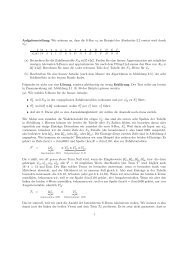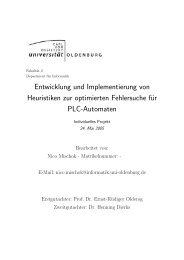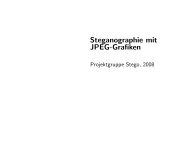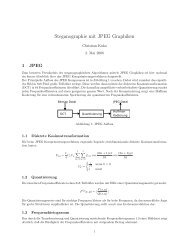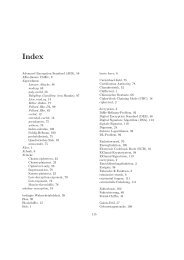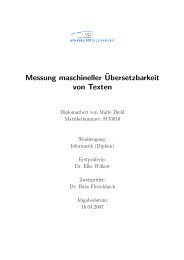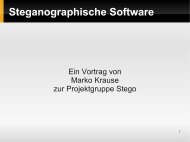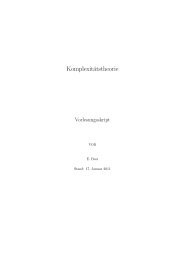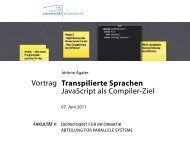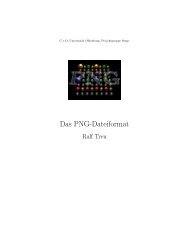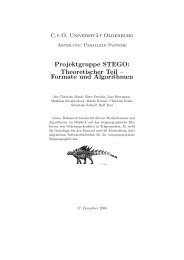Lesson 1.1: Hello, world
Lesson 1.1: Hello, world
Lesson 1.1: Hello, world
Create successful ePaper yourself
Turn your PDF publications into a flip-book with our unique Google optimized e-Paper software.
<strong>Lesson</strong> <strong>1.1</strong>: <strong>Hello</strong>, <strong>world</strong><br />
Programming in C<br />
Prof. Dr. Eike Best<br />
Dr. Elke Wilkeit<br />
September 28, 2002<br />
1 #include <br />
2<br />
3 main()<br />
4 {<br />
5 printf("hello, <strong>world</strong>\n");<br />
6 }<br />
Exercise 1-1 (my first C program) (a) Run the ‘‘hello-<strong>world</strong>” program on<br />
your system. Experiment with leaving out parts of the program to see what error<br />
messagees you get. In particular, leave out the newline-escape-sequence.<br />
Exercise 1-2a (escape sequences) Experiment to find out what happens when<br />
printf’s argument string contains \c , where c is some character different from n.<br />
1-2b Write a program that prints the meaning of all escape sequences. Try \\ in<br />
order to print a single \ (this is also an escape sequence).<br />
Exercise 1-1b (hello, <strong>world</strong> — revisited) Write a program that prints the<br />
string ‘‘hello, <strong>world</strong>! ” in the first line, then ‘‘ello, <strong>world</strong>! h” , in the second line,<br />
‘‘llo, <strong>world</strong>! he” in the third line, and so on, moving the first character to the end<br />
of the string, until the original string is reached again in the last line.
<strong>Lesson</strong>s 1.2, 1.3 and 1.4:<br />
Fahrenheit and Celsius<br />
Programming in C<br />
Prof. Dr. Eike Best<br />
Dr. Elke Wilkeit<br />
September 28, 2002<br />
1 #include <br />
2<br />
3 /* print Fahrenheit-Celsius table<br />
4 for fahr = 0, 20, ..., 300 */<br />
5 main()<br />
6 {<br />
7 int fahr, celsius;<br />
8 int lower, upper, step;<br />
9<br />
10 lower = 0; /* lower limit of temperature table */<br />
11 upper = 300; /* upper limit of temperature table */<br />
12 step = 20; /* step size */<br />
13<br />
14 fahr = lower;<br />
15 while (fahr
Exercise 1-3. (heading) Modify the temperature conversion program to print<br />
a heading above the table. The first column of the table should be four characters<br />
wide and have no decimal point and no fraction digits. The second column should<br />
be eight characters wide and should have two fraction digits.<br />
Exercise 1-4 (conversion) Write a program to print the correponding Celsius<br />
to Fahrenheit table. Choose another layout than in Exercise 1-3.<br />
1 #include <br />
2<br />
3 main()<br />
4 {<br />
5 int fahr;<br />
6<br />
7 for (fahr = 0; fahr
<strong>Lesson</strong> 1.5:<br />
Character input and output (1/3)<br />
Programming in C<br />
Prof. Dr. Eike Best<br />
Dr. Elke Wilkeit<br />
September 28, 2002<br />
1 #include <br />
2<br />
3 /* copy input to output; 1st version */<br />
4 main()<br />
5 {<br />
6 int c;<br />
7<br />
8 c = getchar();<br />
9 while (c != EOF) {<br />
10 putchar(c);<br />
11 c = getchar();<br />
12 }<br />
13 }<br />
1 #include <br />
2<br />
3 /* copy input to output; 2nd version */<br />
4 main()<br />
5 {<br />
6 int c;<br />
7<br />
8 while ((c =getchar()) != EOF)<br />
9 putchar(c);<br />
10 }<br />
Exercise 1-6. (EOF) Verify that the expression getchar() != EOF is 0 or 1.<br />
Exercise 1-7. (EOF again)<br />
Write a program to print the value of EOF.
<strong>Lesson</strong> 1.5:<br />
Character input and output (2/3)<br />
Programming in C<br />
Prof. Dr. Eike Best<br />
Dr. Elke Wilkeit<br />
September 28, 2002<br />
1 #include <br />
2<br />
3 /* count characters in input; 1st version */<br />
4 main()<br />
5 {<br />
6 long nc;<br />
7<br />
8 nc = 0;<br />
9 while (getchar() != EOF)<br />
10 ++nc;<br />
11 printf("%ld\n", nc);<br />
12 }<br />
1 #include <br />
2<br />
3 /* count characters in input; 2nd version */<br />
4 main()<br />
5 {<br />
6 double nc;<br />
7<br />
8 for (nc = 0; getchar() != EOF; ++nc)<br />
9 ;<br />
10 printf("%.0f\n", nc);<br />
11 }<br />
1 #include <br />
2<br />
3 /* count lines in input */<br />
4 main()<br />
5 {<br />
6 int c, nl;<br />
7<br />
8 nl = 0;<br />
9 while ((c = getchar()) != EOF)<br />
10 if (c == ’\n’)<br />
11 ++nl;<br />
12 printf("%d\n", nl);<br />
13 }<br />
Exercise 1-8. (Counting)<br />
Write a program to count blanks, tabs, and newlines.<br />
Exercise 1-9. (Copying and replacing) Write a program to copy its input to<br />
its output, replacing each string of one or more blanks by a single blank.
<strong>Lesson</strong> 1.5:<br />
Character input and output (3/3)<br />
Programming in C<br />
Prof. Dr. Eike Best<br />
Dr. Elke Wilkeit<br />
September 28, 2002<br />
Exercise 1-10. (More copying and replacing) Write a program to copy its<br />
input to its output, replacing each tab by \t, each backspace by \b, and each<br />
backslash by \\. This makes tabs and backspaces visible in an unambiguous way.<br />
1 #include <br />
2<br />
3 #define IN 1 /* inside a word */<br />
4 #define OUT 0 /* outside a word */<br />
5<br />
6 /* count lines, words, and characters in input */<br />
7 main()<br />
8 {<br />
9 int c, nl, nw, nc, state;<br />
10<br />
11 state = OUT;<br />
12 nl = nw = nc = 0;<br />
13 while ((c = getchar()) != EOF) {<br />
14 ++nc;<br />
15 if (c == ’\n’)<br />
16 ++nl;<br />
17 if (c == ’ ’ || c == ’\n’ || c == ’\t’)<br />
18 state = OUT;<br />
19 else if (state == OUT) {<br />
20 state = IN;<br />
21 ++nw;<br />
22 }<br />
23 }<br />
24 printf("%d %d %d\n", nl, nw, nc);<br />
25 }<br />
Exercise 1-11. (Testing) How would you test the word count program? What<br />
kinds of inputs are most likely to uncover bugs if there are any?<br />
Exercise 1-12. (Reformatting)<br />
per line.<br />
Write a program that prints its input one word
<strong>Lesson</strong> 1.6:<br />
Arrays<br />
Programming in C<br />
Prof. Dr. Eike Best<br />
Dr. Elke Wilkeit<br />
September 28, 2002<br />
1 #include <br />
2<br />
3 /* count digits, white space, others */<br />
4 main()<br />
5 {<br />
6 int c, i, nwhite, nother;<br />
7 int ndigit[10];<br />
8<br />
9 nwhite = nother = 0;<br />
10 for (i = 0; i < 10; ++i)<br />
11 ndigit[i] = 0;<br />
12<br />
13 while ((c = getchar()) != EOF)<br />
14 if (c >= ’0’ && c
<strong>Lesson</strong> 1.7:<br />
Functions<br />
Programming in C<br />
Prof. Dr. Eike Best<br />
Dr. Elke Wilkeit<br />
September 28, 2002<br />
1 #include <br />
2<br />
3 int power(int m, int n);<br />
4<br />
5 /* test power function */<br />
6 main()<br />
7 {<br />
8 int i;<br />
9<br />
10 for (i = 0; i < 10; ++i)<br />
11 printf("%d %d %d\n", i, power(2,i), power(-3,i));<br />
12 return 0;<br />
13 }<br />
14<br />
15 /* power: raise base to n-th power; n>=0 */<br />
16 int power(int base, int n)<br />
17 {<br />
18 int i,p;<br />
19<br />
20 p = 1;<br />
21 for (i = 1; i
<strong>Lesson</strong> 1.8:<br />
Arguments are call-by-value<br />
Programming in C<br />
Prof. Dr. Eike Best<br />
Dr. Elke Wilkeit<br />
September 28, 2002<br />
1 /* power: raise base to n-th power; n>=0; version 2 */<br />
2 int power(int base, int n)<br />
3 {<br />
4 int p;<br />
5<br />
6 for (p = 1; n > 0; --n)<br />
7 p = p * base;<br />
8 return p;<br />
9 }
<strong>Lesson</strong> 1.9:<br />
Character arrays (1/2)<br />
Programming in C<br />
Prof. Dr. Eike Best<br />
Dr. Elke Wilkeit<br />
September 28, 2002<br />
1 while ( there is another line )<br />
2 if ( it is longer than the previous longest )<br />
3 save it ;<br />
4 save its length ;<br />
5 print longest line<br />
Exercise 1-16. (Error-tolerant longest-line program) Revise the main routine<br />
of the longest-line program so it will correctly print the length of arbitrarily<br />
long lines, and as much as possible of the text.<br />
Exercise 1-17. (Printing lines longer than 80 characters)<br />
to print all input lines that are longer than 80 characters.<br />
Write a program<br />
Exercise 1-18. (Removing trailing invisibles) Write a program to remove<br />
trailing blanks and tabs from each line of input, and to delete entirely blank lines.<br />
Exercise 1-19. (Reversing strings) Write a function reverse(s) that reverses<br />
the character string s. Use it to write a program that reverses its input a line at a<br />
time.
1 #include <br />
2 #define MAXLINE 1000 /* maximum input line size */<br />
3<br />
4 int getline(char line[], int maxline);<br />
5 void copy(char to[], char from[]);<br />
6<br />
7 /* print longest input line */<br />
8 main()<br />
9 {<br />
10 int cur_len; /* current line length */<br />
11 int cur_max; /* maximum seen so far */<br />
12 char cur_line[MAXLINE]; /* current input line */<br />
13 char longest[MAXLINE]; /* longest line saved here */<br />
14<br />
15 cur_max = 0;<br />
16 while ((cur_len = getline(cur_line, MAXLINE)) > 0)<br />
17 if (cur_len > cur_max) {<br />
18 cur_max = cur_len;<br />
19 copy(longest, cur_line);<br />
20 }<br />
21 if (cur_max > 0) /* there was a line */<br />
22 printf("%s", longest);<br />
23 return 0;<br />
24 }<br />
25<br />
26 /* getline: read a line into s, return length */<br />
27 int getline(char s[], int limit)<br />
28 {<br />
29 int c, i;<br />
30<br />
31 for (i=0; i
<strong>Lesson</strong> <strong>1.1</strong>0:<br />
External variables and scopes (1/2)<br />
Programming in C<br />
Prof. Dr. Eike Best<br />
Dr. Elke Wilkeit<br />
September 28, 2002<br />
1 #include <br />
2 #define MAXLINE 1000 /* maximum input line size */<br />
3<br />
4 int cur_max; /* maximum length seen so far */<br />
5 char cur_line[MAXLINE]; /* current input line */<br />
6 char longest[MAXLINE]; /* longest line saved here */<br />
7<br />
8 int getline(void);<br />
9 void copy(void);<br />
10<br />
11 /* print longest input line; specialised version */<br />
12 main()<br />
13 {<br />
14 int cur_len; /* current line length */<br />
15 extern int cur_max;<br />
16 extern char cur_line[];<br />
17 extern char longest[];<br />
18<br />
19 cur_max = 0;<br />
20 while ((cur_len = getline()) > 0)<br />
21 if (cur_len > cur_max) {<br />
22 cur_max = cur_len;<br />
23 copy();<br />
24 }<br />
25 if (cur_max > 0) /* there was a line */<br />
26 printf("%s", longest);<br />
27 return 0;<br />
28 }<br />
29<br />
30 /* getline: specialised version */<br />
31 int getline(void)<br />
32 {<br />
33 int c, i;<br />
34 extern char cur_line[];<br />
35<br />
36 for (i=0; i
43 return i;<br />
44 }<br />
45<br />
46 /* copy: specialised version */<br />
47 void copy(void)<br />
48 {<br />
49 int i;<br />
50 extern char cur_line[], longest[];<br />
51<br />
52 i = 0;<br />
53 while ((longest[i] = cur_line[i]) != ’\0’)<br />
54 ++i;<br />
55 }<br />
Exercise 1-20. (Expanding tabs) Write a program detab that replaces tabs in<br />
the input with the proper number of blanks to space to the next tab stop. Assume a<br />
fixed number of tab stops, say every n columns. Should n be a variable or a symbolic<br />
parameter?<br />
Exercise 1-21. (Inserting tabs) Write a program entab that replaces strings<br />
of blanks by the minimum number of tabs and blanks to achieve the same spacing.<br />
Use the same tab stops as for detab. When either a tab or a single blank would<br />
suffice to reach a tab stop, which should be given preference?<br />
Exercise 1-22. (Breaking lines) Write a program to ‘fold’ long input lines into<br />
two or more shorter lines after the last non-blank character that occurs before the<br />
nth column of input. Make sure your program does something intelligent with very<br />
long lines, and if there are no blanks or tabs before the specified column.<br />
Exercise 1-23. (Removing comments) Write a program to remove all comments<br />
from a C program. Don’t forget to handle quoted strings and character<br />
constants properly. C comments do not nest.<br />
Exercise 1-24. (Syntax checking) Write a program to check a C program for<br />
rudimentary syntax errors like unbalanced parenthese, brackets and braces. Don’t<br />
forget about quotes, both single and double, escape sequences, and comments. (This<br />
program is hard if you do it in full generality.)<br />
<strong>Lesson</strong> <strong>1.1</strong>0, 2nd page



